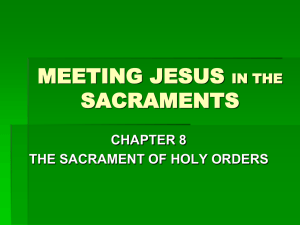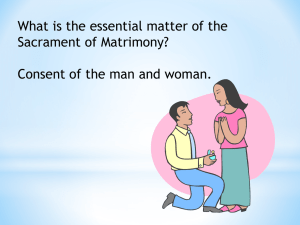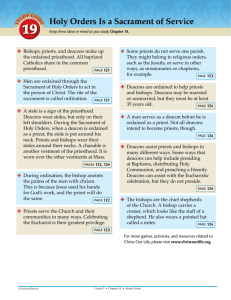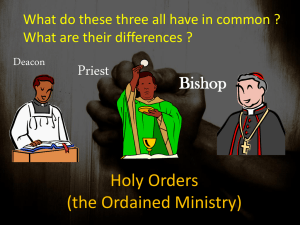Sacrament of Holy Orders
advertisement
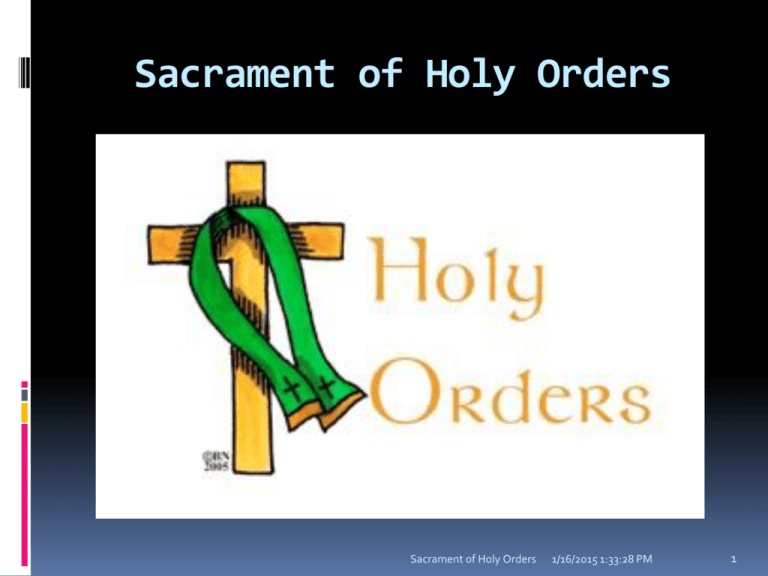
Sacrament of Holy Orders Sacrament of Holy Orders 1/16/2015 1:33:28 PM 1 What is the sacrament of Holy Orders? “Holy Orders is a Sacrament by which bishops, priests, and other ministers of the Church are ordained and receive the power and grace to perform their sacred duties.”. Holy Orders is the sacrament through which the mission entrusted by Christ to his apostles continues to be exercised in the Church until the end of time: thus it is the sacrament of apostolic ministry. Sacrament of Holy Orders 1/16/2015 1:33:29 PM 2 Canon Law and Sacrament of Holy Orders By divine institution, some among Christ's faithful are, through the sacrament of Order, marked with an indelible character, and are thus constituted sacred ministers…. They are thereby consecrated and deputed so that each according to his own grade, they fulfill, in the person of Christ the Head, the offices of teaching, sanctifying, and ruling, and so they nourish the people of God. (Canon 1008). Sacrament of Holy Orders 1/16/2015 1:33:29 PM 3 Why is this sacrament called "ORDERS"? The word order in Roman antiquity designated an established civil body, especially a governing body. Ordinatio means incorporation into an ordo. In the Church there are established bodies which Tradition, not without a basis in Sacred Scripture,4 has since ancient times called taxeis (Greek) or ordines. And so the liturgy speaks of the ordo episcoporum, the ordo presbyterorum, the ordo diaconorum. Sacrament of Holy Orders 1/16/2015 1:33:29 PM 4 Today the word "ordination" is reserved for the sacramental act which integrates a man into the order of bishops, presbyters, or deacons, and goes beyond a simple election, designation, delegation, or institution by the community, for it confers a gift of the Holy Spirit that permits the exercise of a "sacred power" which can come only from Christ himself through his Church. Ordination is also called consecratio, for it is a setting apart and an investiture by Christ himself for his Church. Sacrament of Holy Orders 1/16/2015 1:33:29 PM 5 Major and Minor Orders The major orders were the Episcopate, Priesthood, Diaconate, and Sub-diaconate. The minor orders were acolyte, porter, lector, and exorcist. Since the sub-diaconate was not a sacrament, Paul VI suppressed the subdiaconate in the Latin Rite of the Catholic Church during the Second Vatican Council. Sacrament of Holy Orders 1/16/2015 1:33:29 PM 6 Degrees of Priesthood The episcopacy and the presbyterate are the two degrees of ministerial participation in the priesthood of Christ. The diaconate is intended to help and serve them. For this reason the term sacerdos in current usage denotes bishops and priests but not deacons. Yet Catholic doctrine teaches that the degrees of priestly participation (episcopate and presbyterate) and the degree of service (diaconate) are all three conferred by a sacramental act called "ordination," that is, by the sacrament of Holy Orders (CCC 1554). Sacrament of Holy Orders 1/16/2015 1:33:29 PM 7 Episcopate Highest form of the sacrament of Orders. Council of Trent defined that bishops are superior to priests. This pre-eminence of the bishops refers both to their exercise of authority and to their power of consecration. only bishops have the power of ordaining bishops, priests, or deacons. "No bishop is permitted to consecrate anyone as bishop unless it is first established that a pontifical mandate has been issued" (Canon 1013). Sacrament of Holy Orders 1/16/2015 1:33:29 PM 8 By the laying on of hands men were ordained to the episcopate so that by the year 100 A. D., there were over one hundred dioceses in existence around the Mediterranean world. In every case, the ordination to the episcopate began with the apostles ordained by Christ at the Last Supper, so that the Episcopal succession of bishops can be literally called the apostolic succession. What needs to be emphasized is that the power of Episcopal orders is also the foundation of Episcopal authority. Sacrament of Holy Orders 1/16/2015 1:33:29 PM 9 In virtue of their ordination, bishops receive the fullness of the sacrament of Order. Only they can confer this sacrament on others. But, as we have seen, their power to teach and rule the People of God depends on their approval by the Bishop of Rome. Sacrament of Holy Orders 1/16/2015 1:33:29 PM 10 Priesthood In the Church's language, bishops have the fullness of the priesthood, "the highest priest of the first order." Presbyters (priests) are "simple priests of the second order." There is a visible and external priesthood in the New Testament. It consists in the power of consecrating and offering the Body and Blood of the Lord, and of remitting and of retaining sins. The priesthood, therefore, is not only an office and simple ministry of preaching. Sacrament of Holy Orders 1/16/2015 1:33:29 PM 11 Orders, or holy ordination, is truly and properly a sacrament instituted by Christ our Lord. There is a divinely instituted hierarchy consisting of bishops, priests, and ministers. Together with their bishop, priests form a unique priestly community, although dedicated to a variety of different duties. In each local assembly of the faithful, priests may be said to represent the bishop with whom they are to be associated in all trust and generosity (Constitution of the Church, III, 28). Sacrament of Holy Orders 1/16/2015 1:33:29 PM 12 Diaconate The name deacon means "servant" or "minister". The narrative of the martyrdom of St. Stephen (Acts 6:1-6) describes the first beginnings of this office. Two types of Deacons: Transistional Permanent Sacrament of Holy Orders 1/16/2015 1:33:29 PM 13 Duties of a Deacon Among the duties of deacons in the first centuries of the Church, the following stand out. They were stewards of the Church's funds, and of the alms collected for widows and orphans; they were to help with the care of the poor and the aged; their special duty was to read the gospel; they would also preach to the people; they were especially to bring the Holy Eucharist to the sick in their homes; confer the sacrament of Baptism, and assist the bishop or priest in the celebration of the Eucharistic Liturgy. Sacrament of Holy Orders 1/16/2015 1:33:29 PM 14 Biblical basis of Holy Orders The priesthood of the Old Covenant: Although the Chosen People of God was called “a kingdom of priests and a holy nation” (Ex 19:6; cf. Isa 61:6), God chose one of the twelve tribes, that of Levi, and set it apart for liturgical service. Their duty was “to act on behalf of men in relation to God, to offer gifts and sacrifices for sins."(Heb 5:1; cf. Ex 29:130; Lev 8). Sacrament of Holy Orders 1/16/2015 1:33:29 PM 15 Old Testament priesthood was instituted to proclaim the Word of God and to restore communion with God by sacrifices and prayer. (CCC 1540). It was a prefiguring of the ordained ministry of the New Covenant. Everything that the priesthood of the Old Covenant prefigured finds its fulfillment in Christ Jesus, the "one mediator between God and men." The Christian tradition considers Melchizedek, "priest of God Most High," as a pre-figuration of the priesthood of Christ, the unique "high priest after the order of Melchizedek"; "holy, blameless, unstained," "by a single offering he has perfected for all time those who are sanctified," that is, by the unique sacrifice of the cross.( CCC 1544). Sacrament of Holy Orders 1/16/2015 1:33:29 PM 16 The priesthood in the New Testament Jesus Christ is the only priest in the New Testament. As the High Priest Jesus offered a redemptive sacrifice on Calvary for the atonement of our sins and for the salvation of the world. Christ’s sacrifice is made present on the altars through the ministerial priesthood without diminishing the uniqueness of Christ's priesthood: "Only Christ is the true priest, the others being only his ministers." (CCC 1545). Sacrament of Holy Orders 1/16/2015 1:33:29 PM 17 The New Testament speaks about the ordination of priests. In "Mark 3:13-19 Jesus "calls" and "appoints" the 12 apostles. Acts 6:6; 1 Tim 4:14; 5:22; 2 Tim 1:6 describe “laying on of hands" as the "ordaining" or commissioning rite of local Christian leaders. Jesus did select some disciples and make them apostles, giving them a special mission in relation to the rest of the community. This apostolic ministry continues in the Church till today right from St. Peter. "Holy Orders is the sacrament through which the mission entrusted by Christ to his apostles continues to be exercised in the Church. Sacrament of Holy Orders 1/16/2015 1:33:29 PM 18 Difference between Ministerial and Common Priesthood The ministerial priesthood is a means by which Christ unceasingly builds up and leads his Church. Through the ordained ministry, especially that of bishops and priests, the presence of Christ as head of the Church is made visible in the midst of the community of believers while the common priesthood of the faithful is exercised by the unfolding of baptismal grace --a life of faith, hope, and charity, a life according to the Spirit. Sacrament of Holy Orders 1/16/2015 1:33:29 PM 19 Through the ordained ministry, especially that of bishops and priests, the presence of Christ as head of the Church is made visible in the midst of the community of believers. The ministerial priesthood has the task not only of representing Christ - Head of the Church before the assembly of the faithful, but also of acting in the name of the whole Church when presenting to God the prayer of the Church, and above all when offering the Eucharistic sacrifice(CCC 1552). Sacrament of Holy Orders 1/16/2015 1:33:29 PM 20 WHO CAN CONFER THIS SACRAMENT? Since the sacrament of Holy Orders is the sacrament of the apostolic ministry, it is for the bishops as the successors of the apostles to hand on the "gift of the Spirit,"63 the "apostolic line."64 Validly ordained bishops, i.e., those who are in the line of apostolic succession, validly confer the three degrees of the sacrament of Holy Orders.65 Sacrament of Holy Orders 1/16/2015 1:33:29 PM 21 WHO CAN RECEIVE THIS SACRAMENT? "Only a baptized man (vir) validly receives sacred ordination."66 The Lord Jesus chose men (viri) to form the college of the twelve apostles, and the apostles did the same when they chose collaborators to succeed them in their ministry.67 The college of bishops, with whom the priests are united in the priesthood, makes the college of the twelve an ever-present and everactive reality until Christ's return. The Church recognizes herself to be bound by this choice made by the Lord himself. For this reason the ordination of women is not possible.68 Sacrament of Holy Orders 1/16/2015 1:33:29 PM 22 No one has a right to receive the sacrament of Holy Orders. Indeed no one claims this office for himself; he is called to it by God.69 Anyone who thinks he recognizes the signs of God's call to the ordained ministry must humbly submit his desire to the authority of the Church, who has the responsibility and right to call someone to receive orders. Like every grace this sacrament can be received only as an unmerited gift. Sacrament of Holy Orders 1/16/2015 1:33:29 PM 23 All the ordained ministers of the Latin Church, with the exception of permanent deacons, are normally chosen from among men of faith who live a celibate life and who intend to remain celibate "for the sake of the kingdom of heaven."70 Called to consecrate themselves with undivided heart to the Lord and to "the affairs of the Lord,"71 they give themselves entirely to God and to men. Celibacy is a sign of this new life to the service of which the Church's minister is consecrated; accepted with joyous heart celibacy radiantly proclaims the Reign of God.72 Sacrament of Holy Orders 1/16/2015 1:33:29 PM 24 THE EFFECTS OF THE SACRAMENT OF HOLY ORDERS This sacrament configures the recipient to Christ by a special grace of the Holy Spirit, so that he may serve as Christ's instrument for his Church. By ordination one is enabled to act as a representative of Christ, Head of the Church, in his triple office of priest, prophet, and king. As in the case of Baptism and Confirmation this share in Christ's office is granted once for all. The sacrament of Holy Orders, like the other two, confers an indelible spiritual character and cannot be repeated or conferred temporarily.74 Sacrament of Holy Orders 1/16/2015 1:33:29 PM 25 It is true that someone validly ordained can, for grave reasons, be discharged from the obligations and functions linked to ordination, or can be forbidden to exercise them; but he cannot become a layman again in the strict sense,75because the character imprinted by ordination is forever. The vocation and mission received on the day of his ordination mark him permanently. Since it is ultimately Christ who acts and effects salvation through the ordained minister, the unworthiness of the latter does not prevent Christ from acting. Sacrament of Holy Orders 1/16/2015 1:33:29 PM 26 The grace of the Holy Spirit The grace of the Holy Spirit proper to this sacrament is configuration to Christ as Priest, Teacher, and Pastor, of whom the ordained is made a minister. With regard to deacons, "strengthened by sacramental grace they are dedicated to the People of God, in conjunction with the bishop and his body of priests, in the service (diakonia) of the liturgy, of the Gospel, and of works of charity." Sacrament of Holy Orders 1/16/2015 1:33:29 PM 27 THE CELEBRATION OF THIS SACRAMENT Given the importance that the ordination of a bishop, a priest, or a deacon has for the life of the particular Church, its celebration calls for as many of the faithful as possible to take part. It should take place preferably on Sunday, in the cathedral, with solemnity appropriate to the occasion. All three ordinations, of the bishop, of the priest, and of the deacon, follow the same movement. Their proper place is within the Eucharistic liturgy. Sacrament of Holy Orders 1/16/2015 1:33:29 PM 28 For bishops and priests, an anointing with holy chrism, a sign of the special anointing of the Holy Spirit who makes their ministry fruitful; giving the book of the Gospels, the ring, the mitre, and the crosier to the bishop as the sign of his apostolic mission to proclaim the Word of God, of his fidelity to the Church, the bride of Christ, and his office as shepherd of the Lord's flock; presentation to the priest of the paten and chalice, "the offering of the holy people" which he is called to present to God; giving the book of the Gospels to the deacon who has just received the mission to proclaim the Gospel of Christ. Sacrament of Holy Orders 1/16/2015 1:33:29 PM 29 Conclusion St. Paul said to his disciple Timothy: "I remind you to rekindle the gift of God that is within you through the laying on of my hands" (2 Tim 1:6), and "If any one aspires to the office of bishop, he desires a noble task." (1 Tim 3:1) To Titus he said: "This is why I left you in Crete, that you amend what was defective, and appoint presbyters in every town, as I directed you" (Titus 1:5). The ministry conferred by the sacrament of Holy Orders is to serve in the name and in the person of Christ the Head in the midst of the community. Sacrament of Holy Orders 1/16/2015 1:33:29 PM 30
